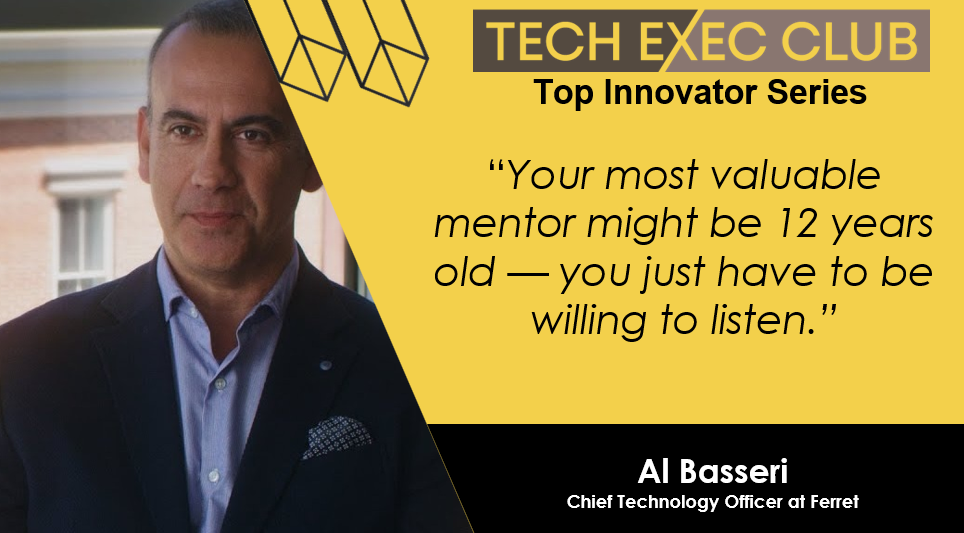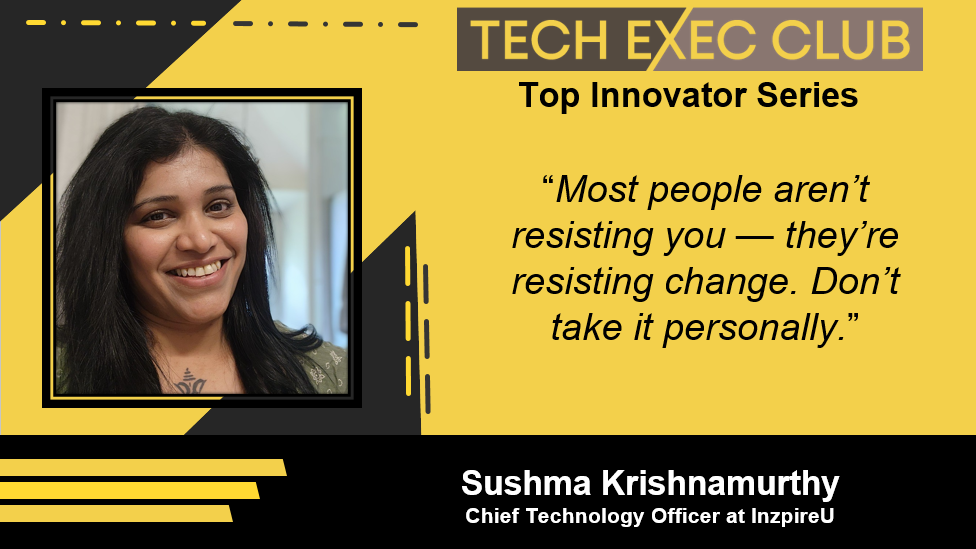Leadership lessons can come from anywhere — a jazz improvisation, a kitchen recipe, or even a conversation with a 12-year-old. That’s the ethos of Al Basseri, CTO of Ferret, an AI-powered platform helping individuals and organizations identify risks and opportunities. But unlike many tech executives who stay within the boundaries of traditional leadership frameworks, Basseri has built his career — and his teams — by deliberately stepping outside his comfort zone.
In this wide-ranging conversation with Josef Martens, founder of the Tech Executive Club and host of the Top Innovator Series, Basseri unpacks a leadership philosophy that is as human as it is strategic. He challenges conventional wisdom by drawing analogies from Miles Davis’ genre-bending career, the creative experimentation of world-class chefs, and even Gen Z’s media habits. He makes a compelling case for multi-sensory, multi-generational leadership.
At the heart of Basseri’s approach lies a bold, often counterintuitive principle: Your most valuable mentors may not be the ones with decades of experience—they might be the ones who have yet to graduate high school. He believes innovation flourishes not in echo chambers but in environments of diverse thinking, creative friction, and constant discomfort.
What follows is a leadership journey filled with insights, metaphors, and practical wisdom—a story that will inspire leaders at all levels to rethink how they grow, build teams, and prepare for the future by learning from the most unexpected places.
Expanding Leadership Through Multi-Generational Mentorship
Most leaders look upward for mentorship — toward those with more experience, more titles, and longer resumes. But Al Basseri flips that logic on its head. To him, leadership growth doesn’t just come from learning from those who’ve done it before — it comes from listening to those who haven’t.
“I have mentors in their teens and twenties,” he says matter-of-factly. For Basseri, young people offer a raw, unfiltered lens into the future. They haven’t internalized the limiting assumptions or industry dogmas often weighing down seasoned professionals. They experiment freely, adapt quickly, and usually see things others miss — not despite their lack of experience but because of it.
It’s not always about direct advice either — sometimes, it’s simply about observing how younger minds operate, consume content, interact with technology, or make decisions. Whether watching his children’s buying habits or paying attention to the influencer economy through TikTok and YouTube, Basseri sees this as a critical part of staying ahead in tech leadership.
“If you’re not learning from the generation coming up, you’re already falling behind,” he notes. Innovation isn’t a top-down directive in a rapidly evolving digital landscape — it’s a two-way conversation across generations. And the leaders who embrace that dynamic will be the ones who thrive.
Breaking Out of the Echo Chamber: Leading with All Senses
One of the most intriguing ideas Al Basseri presents is his metaphor of “leading with all your senses.” More than just a poetic analogy, it’s a powerful leadership philosophy—a call to engage the full range of human perception in decision-making and team-building.
“We create echo chambers without realizing it,” Basseri explains. We surround ourselves with people who think like us, validate our ideas, and make us feel comfortable.” But that comfort, he argues, is deceptive. It dulls our awareness, narrows our input channels, and eventually leads to stale thinking.
To counter this, Basseri encourages leaders to open themselves—not just to data and analysis but to intuition, emotion, art, contrast, and even cultural discomfort. He likens this to expanding one’s palate in the kitchen: if you keep cooking the same 24 meals, you’ll never discover the next great dish.
This is more than a metaphor — it’s a hiring strategy, a product design principle, and an innovation driver. Whether listening to unfamiliar music, exploring new user behavior patterns, or hiring people from nontraditional backgrounds, Basseri’s philosophy is straightforward: leadership requires sensory expansion.
If you’re only using logic and spreadsheets to make decisions, you’re missing entire dimensions of insight. It’s time to lead not just with your mind — but with all your senses.
Getting Comfortable with Discomfort: The Innovation Imperative
If there’s one constant in Al Basseri’s career, it’s his refusal to stay comfortable. He views discomfort not as a threat but as an essential nutrient for personal and organizational growth. “People say they don’t like change,” he says. “But it’s not just about change — it’s about the discomfort that comes with leaving your comfort zone.”
This mindset is deeply embedded in Basseri’s approach to innovation. He deliberately shifts industries, roles, and teams to avoid stagnation. He studies leaders like Miles Davis, who didn’t just innovate within jazz — he reinvented it multiple times by continuously surrounding himself with fresh talent and new ideas.
Basseri applies the same lesson in tech leadership. Innovation dies when everyone gets too familiar with the same tools, strategies, or team dynamics. “You have to break the pattern,” he says. “You have to change the tune.”
His analogy is sharp: just like large tech companies often acquire startups to inject innovation into the system, leaders must constantly find ways to bring that M&A energy into their thinking. Whether it’s hiring younger voices, partnering with outsiders, or simply listening instead of talking — discomfort is the door to creativity.
The most dangerous place for a leader to be, Basseri believes, is in a place that feels too easy, too familiar, too safe. Growth only happens in motion — and motion begins with friction.
Hiring and Building Teams for Cognitive Dissonance, Not Just Chemistry
The traditional hiring mantra — “hire for cultural fit” — is one Al Basseri isn’t afraid to challenge. He believes it’s often the opposite of what drives innovation. “Sometimes you need to hire people who make you uncomfortable,” he says. “People who bring tension, challenge your thinking, even create conflict.”
This isn’t just a contrarian view — it’s a strategic one. Basseri sees cognitive dissonance as a necessary ingredient for creativity. If everyone in the room agrees too quickly, the team is probably missing something. Innovation, he argues, comes from friction — from the collision of opposing perspectives, disciplines, and experiences.
He cites examples from iconic companies like Pixar, where artists and engineers blended divergent mindsets to build magic, and from his own career, where hiring someone outside the “expected profile”—someone not from MIT, Caltech, or Stanford—brought fresh insights and outperformed expectations.
Of course, this approach isn’t always welcomed. He’s had HR push back on hires that didn’t “fit the mold.” But Basseri stands firm: diversity of thought is not optional — it’s essential. And it’s not just about team building. It extends to partnerships, go-to-market strategies, and customer engagement as well.
Leaders can’t afford to build echo chambers in a world that is moving faster than ever. The goal isn’t harmony — it’s productive tension.
Recognizing and Cultivating Emerging Leadership from Within
There’s a quiet power in stepping back—in letting others rise. According to Al Basseri, that’s when authentic leadership emerges. One of the most surprising lessons he’s learned over the years is how often natural leaders surface when you give them space to lead.
“It’s amazing,” he says. “You give people the right environment, and they’ll often exceed your expectations — even your capabilities.”
Basseri has seen this firsthand, watching people who once worked under him grow into roles he now admires from afar. “I look at some of them and think — I should have worked for them, not the other way around.”
This humility—the willingness to celebrate others’ growth without needing to create it—is a hallmark of servant leadership. It’s also a sharp counterpoint to command-and-control leadership models that exist in many tech organizations.
In Basseri’s view, cultivating leadership means creating space, not control. It means giving people room to experiment, fail, evolve, and eventually lead. It means letting go of the spotlight so others can shine.
It also means recognizing that the next great leader might already be on your team—they need you to get out of their way.
Al Basseri’s unconventional and human-centric approach to leadership is more than a philosophy — it’s a roadmap for cultivating innovation, building stronger teams, and expanding your potential as a leader. Here’s how you can begin implementing his insights in your organization today:
1. Seek Out Mentors Across Generations — Especially Younger Ones: Don’t limit mentorship to those older or more experienced than you. Identify rising voices — even teenagers or early-career professionals — and observe how they operate, think, and consume the world. Listen, watch, and learn from their habits and behaviors. They are living in the future you’re preparing to lead in.
2. Break Your Echo Chamber: Engage All Your “Senses”: Diversify how you receive information and feedback — intellectually, emotionally, and culturally. Read content you usually wouldn’t. Listen to unfamiliar music. Engage with perspectives outside your industry or comfort zone. Use metaphorical “senses” like taste, intuition, feeling, and contrast to open new channels of insight and perception.
3. Get Comfortable with Discomfort: Innovation requires risk — and risk involves discomfort. Actively put yourself in situations that challenge your assumptions and push you to grow. Make discomfort a leadership habit, not an exception.
4. Hire for Cognitive Dissonance, Not Just Chemistry: Reconsider “culture fit” as your primary hiring criterion. Bring in people with unconventional backgrounds, opposing perspectives, or ideas that may cause friction — that’s where innovation is born. Trust that tension, if managed well, fuels creativity more than harmony ever will.
5. Make Space for Emerging Leaders: Step back and observe who rises in your organization when given the room to lead. Develop a culture that celebrates growth from within — not just performance but potential. Remember that your leadership legacy is not what you built — it’s who you built.
Al Basseri is more than just a seasoned CTO — he’s a leadership philosopher, a boundary-pusher, and a living example of how innovation begins with curiosity and humility. Whether drawing lessons from Miles Davis, listening to 12-year-olds to understand the next wave of tech behaviors, or hiring people who challenge his assumptions, Basseri’s leadership journey is a masterclass in thinking beyond the playbook.
Titles or trends don’t bind his approach — it’s guided by a deep belief in growth through contrast, learning through discomfort, and leading with all senses. In a world where organizations too often default to the safe, the familiar, and the comfortable, Basseri’s philosophy is a refreshing reminder that breakthroughs happen when leaders dare to stretch their perception and surround themselves with a difference — not sameness.
As teams and organizations seek to navigate increasingly complex landscapes, Al Basseri stands as a model of what it means to lead with openness, reinvention, and a relentless appetite for learning. His leadership proves that innovation doesn’t come from certainty—it comes from curiosity.
Want to hear Al Basseri’s insights firsthand? Watch the full, live podcast interview [click here]





